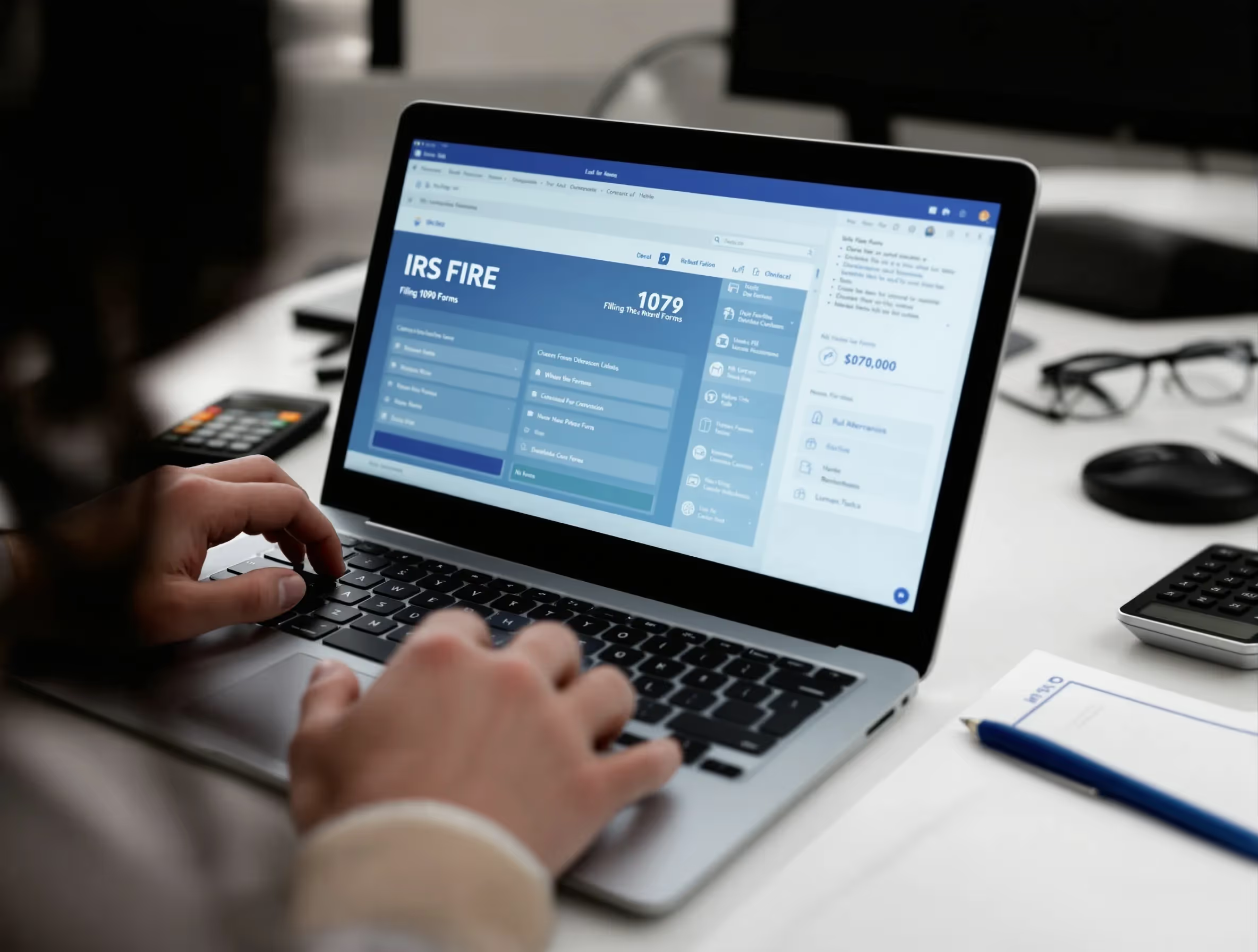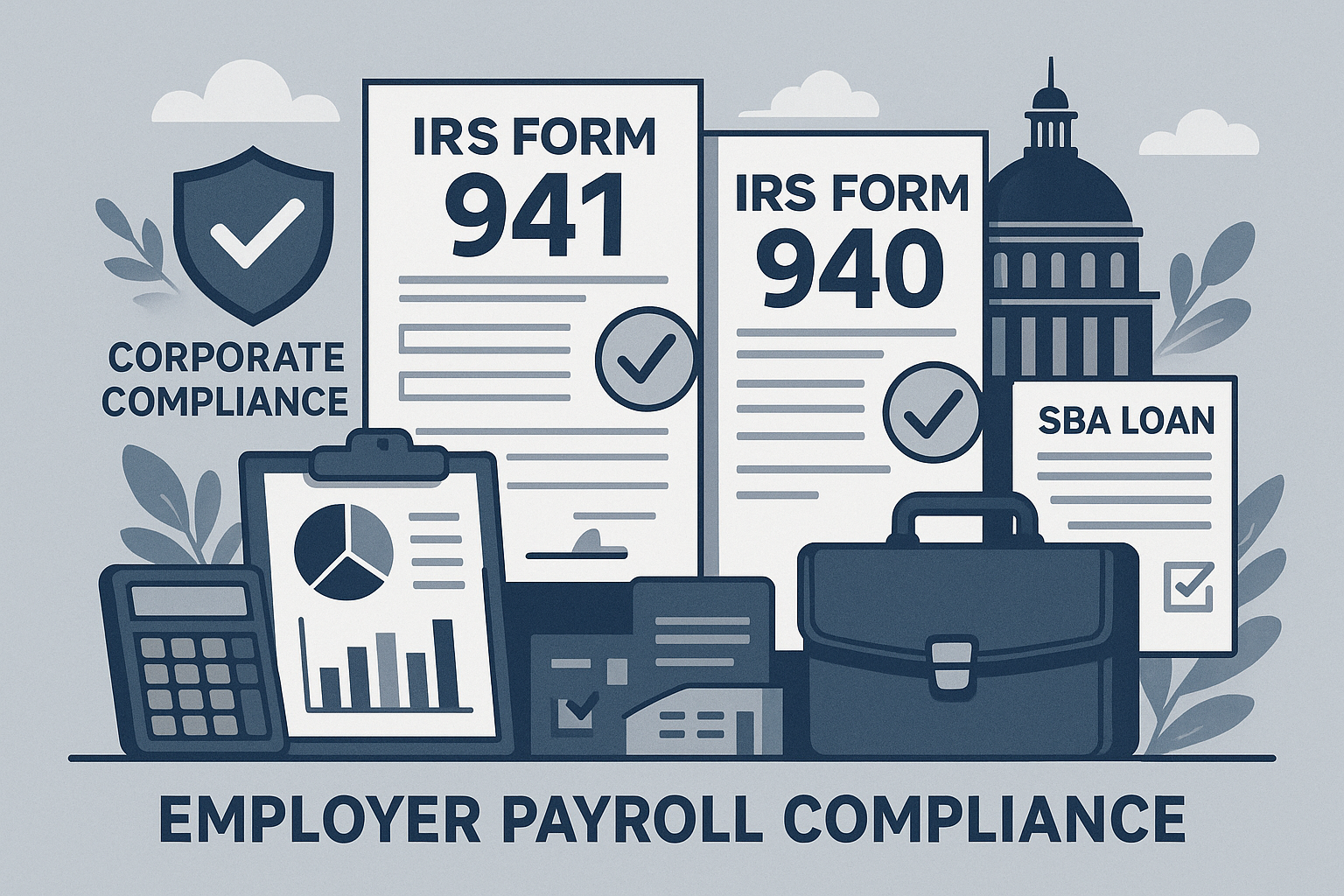
Navegar por los sistemas de presentación electrónica del IRS puede resultar abrumador para las empresas, los profesionales de impuestos y las personas que son nuevas en el proceso. El IRS usa diferentes códigos y servicios para rastrear quién presenta la declaración, qué tipo de declaraciones se presentan y cómo se comparte la información. Entre los más importantes se encuentran el código de control del transmisor (TCC), el número de identificación electrónica para presentar la solicitud (EFIN) y el servicio exprés de verificación de ingresos (IVES). Cada uno cumple una función específica, y saber cuál se aplica a su situación le ayuda a cumplir con las normas y a evitar demoras innecesarias.
Comprender las diferencias entre TCC, EFIN e IVES es especialmente importante, ya que la presentación electrónica se convierte en el método estándar para la mayoría de los formularios. El IRS ha trasladado gran parte de su procesamiento a Internet, con sistemas como el Sistema de admisión de devoluciones informativas (IRIS) que reemplazan los métodos de presentación más antiguos. Es posible que las pequeñas empresas, las asociaciones, los contadores públicos públicos y las instituciones financieras necesiten códigos diferentes según si presentan declaraciones informativas, preparan declaraciones de impuestos o solicitan la verificación de ingresos para los préstamos.
Esta guía explica cómo funcionan estos sistemas, describe el proceso de solicitud para cada uno y muestra ejemplos prácticos de quién necesita qué. Ya sea una empresa que emite los formularios 1099, un profesional de impuestos que prepara miles de declaraciones o un prestamista que necesita acceder rápidamente a las transcripciones, este artículo responde claramente a sus preguntas. El objetivo es hacer que estos programas del IRS sean más fáciles de entender para que pueda elegir el camino correcto, presentar los formularios correctamente y mantenerse al día con los requisitos de cumplimiento.
¿Qué son TCC, EFIN e IVES?
El IRS usa tres sistemas separados para administrar la presentación electrónica y el intercambio de información. Cada sistema tiene un propósito distinto, y las empresas, los profesionales de impuestos y las instituciones financieras deben entender en qué se diferencian antes de presentar la solicitud. Considérelos como tres claves únicas: una abre el acceso para presentar declaraciones informativas, otra autoriza la presentación electrónica de las declaraciones de impuestos y la tercera proporciona las transcripciones de ingresos para la verificación financiera.
- Código de control del transmisor (TCC)
- Se requiere un TCC para quienes presenten declaraciones informativas, como los formularios 1099, 1098 y W-2G.
- Funciona a través del Sistema de admisión de devoluciones de información (IRIS) y el sistema FIRE, que están diseñados para procesar grandes volúmenes de formularios.
- Las empresas deben solicitar el código de control del transmisor correcto en función de si utilizan IRIS o FIRE.
- Se requiere un TCC para quienes presenten declaraciones informativas, como los formularios 1099, 1098 y W-2G.
- Número de identificación de presentación electrónica (EFIN)
- Un EFIN se asigna a las empresas y personas que están autorizadas a transmitir las declaraciones de impuestos electrónicamente.
- Los profesionales de impuestos y las firmas que preparen más de 10 declaraciones individuales deben solicitar un EFIN.
- Este número valida que el IRS aprueba que el preparador se conecte a través del sistema de presentación electrónica.
- Un EFIN se asigna a las empresas y personas que están autorizadas a transmitir las declaraciones de impuestos electrónicamente.
- Servicio exprés de verificación de ingresos (IVES)
- IVES es un servicio que permite a los usuarios autorizados, como los prestamistas hipotecarios o los bancos, solicitar las transcripciones directamente al IRS.
- Estas transcripciones se utilizan para verificar los ingresos de préstamos u otros servicios financieros.
- El acceso requiere tanto una solicitud como la autorización del contribuyente, generalmente a través del formulario 4506-C.
- IVES es un servicio que permite a los usuarios autorizados, como los prestamistas hipotecarios o los bancos, solicitar las transcripciones directamente al IRS.
Al comprender las funciones de TCC, EFIN e IVES, las empresas y las personas pueden elegir el método adecuado para sus necesidades. Cada sistema tiene su propio proceso de solicitud, método de presentación y requisitos, pero todos tienen el mismo objetivo: agilizar el cumplimiento y garantizar un manejo seguro de la información tributaria.
TCC (código de control del transmisor): la clave de devolución de información
UN Código de control del transmisor, o TCC, es obligatorio para las empresas que presentan declaraciones informativas, como los formularios 1099, 1098 y W-2G. Conecta su empresa con los sistemas del IRS que procesan y validan estas presentaciones.
¿Cuándo necesita un TCC?
- Si presenta 10 o más declaraciones informativas en un año, incluso con diferentes tipos de formularios, debe solicitar un TCC.
- Se requiere un TCC si desea presentar declaraciones informativas electrónicamente, incluso si presenta menos de 10.
- Las empresas que soliciten extensiones de presentación también deben solicitar un TCC.
- La participación en el Programa combinado de presentación de solicitudes federales/estatales requiere un TCC válido.
FIRE contra IRIS TCC
- El sistema FIRE admite muchos formularios y se ha utilizado durante mucho tiempo para la presentación masiva de declaraciones informativas.
- El sistema IRIS es más nuevo y está basado en la web, y eventualmente reemplazó a FIRE como la principal forma de presentar las declaraciones de información.
Proceso de solicitud y fechas límite
- Debe presentar su solicitud de TCC en línea a través del IRS y verificar su identidad a través de ID.me utilizando una identificación válida emitida por el gobierno.
- La fecha límite para presentar la solicitud es el 1 de noviembre del año anterior a la presentación, y el IRS recomienda dejar al menos 45 días para su procesamiento.
Múltiples TCC
- Las empresas que presentan diferentes tipos de declaración pueden necesitar TCC separados para los sistemas FIRE e IRIS.
- Los transmisores que presentan solicitudes para varias empresas no relacionadas o que tienen varias entidades también pueden requerir varios códigos.
EFIN (número de identificación de presentación electrónica): autoridad de presentación de declaraciones de impuestos
Un número de identificación de presentación electrónica, o EFIN, autoriza a las empresas y a los profesionales de impuestos a transmitir las declaraciones de impuestos electrónicamente a través del sistema de presentación electrónica del IRS. Verifica que el IRS apruebe al declarante para presentar declaraciones de personas o empresas.
¿Cuándo se necesita un EFIN?
- Debe solicitar un EFIN si prepara y presenta electrónicamente más de 10 declaraciones de impuestos individuales en un año.
- Las empresas que brindan servicios de preparación de impuestos o actúan como originadoras de declaraciones electrónicas también deben obtener un EFIN.
Proceso de solicitud
- El proceso comienza creando una cuenta de servicios electrónicos del IRS y completando la solicitud de presentación electrónica del IRS.
- Debe identificar a los funcionarios responsables, pasar una verificación de idoneidad y esperar la aprobación del IRS antes de recibir su EFIN.
Cumplimiento y seguridad
- Un EFIN no se puede transferir si se vende una empresa y debe permanecer bajo el nombre del declarante original.
- El IRS recomienda monitorear su cuenta para detectar actividades sospechosas y comunicarse con ellos de inmediato si su EFIN parece estar comprometido.
IVES (Servicio exprés de verificación de ingresos): Sistema de acceso a transcripciones
El Servicio Exprés de Verificación de Ingresos, o IVES, brinda a los usuarios autorizados, como prestamistas y bancos, acceso a las transcripciones de los contribuyentes. A menudo se usa para confirmar los ingresos al procesar préstamos u otras solicitudes financieras.
¿Quién puede usar IVES?
- Los prestamistas hipotecarios, los bancos y las cooperativas de ahorro y crédito suelen confiar en IVES para confirmar rápidamente los ingresos de los contribuyentes.
- Algunas agencias gubernamentales y proveedores externos aprobados por el IRS también pueden participar en el programa.
Proceso de solicitud
- Para presentar la solicitud, las empresas deben completar el formulario 13803, registrarse para obtener una cuenta de servicios electrónicos del IRS y proporcionar los detalles de la empresa y de seguridad.
- El formulario completo debe enviarse por correo al IRS; se requiere aprobación antes de poder solicitar las transcripciones.
Cómo funciona IVES
- Los contribuyentes deben autorizar las solicitudes de transcripciones completando el formulario 4506-C o a través de su cuenta en línea del IRS.
- Una vez aprobadas, las empresas pueden enviar solicitudes a través de los servicios electrónicos y recibir las transcripciones en tiempo real o en unos pocos días hábiles.
Las diferencias clave de un vistazo
Cada uno de TCC, EFIN e IVES desempeña una función diferente, y conocer las distinciones ayuda a las empresas y a los profesionales de impuestos a aplicar el sistema correcto.
- Un TCC debe presentar declaraciones informativas, como los formularios 1099, 1098 y W-2G, a través de los sistemas FIRE o IRIS.
- Un EFIN autoriza a una empresa o a un profesional de impuestos a presentar electrónicamente declaraciones de impuestos individuales y comerciales mediante el sistema de presentación electrónica del IRS.
- IVES permite a los usuarios autorizados, como prestamistas y bancos, recibir las transcripciones de los contribuyentes para procesar los préstamos y verificar los ingresos.
- El TCC y el EFIN están sujetos a umbrales de presentación específicos, mientras que IVES requiere el consentimiento del contribuyente y la autorización del IRS.
- Ninguno de estos códigos o servicios se puede transferir si se vende una empresa, y cada uno debe aplicarse por separado.
Quién necesita qué: escenarios prácticos
La necesidad de un TCC, EFIN o IVES varía según el tamaño de la empresa, el tipo de servicios ofrecidos y si la empresa interactúa directamente con los clientes o las instituciones financieras. Revisar los escenarios comunes ayuda a ilustrar cuándo se aplica cada código o servicio.
- Es posible que las pequeñas empresas con menos de 10 contratistas no estén legalmente obligadas a obtener un TCC. Sin embargo, presentar la solicitud de manera voluntaria permite a la empresa presentar electrónicamente las declaraciones informativas a través del Sistema de admisión de declaraciones informativas y facilita la preparación para el crecimiento futuro.
- Una empresa que paga a 15 contratistas debe solicitar un TCC a través del sistema IRIS porque ha superado el umbral de presentación electrónica. La presentación de declaraciones informativas sin un código de control del transmisor válido podría conllevar sanciones.
- Una empresa de preparación de impuestos que gestione cientos de declaraciones de impuestos individuales debe solicitar un EFIN. Este requisito forma parte del mandato de presentación electrónica del IRS, que garantiza que los preparadores profesionales transmitan las declaraciones electrónicamente para mayor eficiencia y precisión.
- Una firma de contadores públicos que prepare declaraciones de impuestos y emita declaraciones informativas tendrá que solicitar tanto un EFIN como un TCC. El EFIN permite a la empresa presentar declaraciones de impuestos para personas y empresas, mientras que el TCC es necesario para presentar declaraciones informativas, como los formularios 1099 o 1098.
- Un prestamista hipotecario o un banco que verifique los ingresos de los clientes debe usar IVES para recibir de manera segura las transcripciones de los contribuyentes. Este servicio es esencial para el procesamiento de préstamos porque proporciona datos verificados directamente del IRS.
- Un proveedor de servicios de nómina puede necesitar varios TCC si presenta diferentes tipos de declaraciones para varios clientes. Además, el proveedor necesitará un EFIN si también prepara y presenta declaraciones de impuestos sobre la renta de empresas o particulares.
Estos escenarios muestran que las diferentes organizaciones suelen necesitar varios códigos o servicios. Elegir el sistema correcto no es opcional; es un requisito de cumplimiento que garantiza que las declaraciones se procesen correctamente y que los datos confidenciales de los contribuyentes permanezcan seguros.
Guías de aplicación paso a paso
La solicitud de un TCC, EFIN o IVES requiere una preparación cuidadosa. Cada solicitud tiene pasos únicos, pero todos implican probar los detalles comerciales, verificar las identidades y seguir los procedimientos de seguridad del IRS. Comenzar temprano es la mejor manera de evitar demoras durante la temporada de presentación de impuestos.
Solicitar un TCC
- Las empresas deben completar la solicitud de IR en línea a través del Sitio web del IRS. El proceso requiere crear o usar una cuenta del IRS existente y verificar la identidad de los funcionarios responsables a través de ID.me.
- Para completar la solicitud, se necesita una identificación válida emitida por el gobierno y la información comercial de respaldo. El IRS recomienda presentar las solicitudes antes del 1 de noviembre para tener suficiente tiempo de aprobación antes de la próxima temporada de presentación de solicitudes. Es posible que las solicitudes tardías no se procesen a tiempo, lo que puede retrasar la posibilidad de presentar declaraciones informativas.
Solicitud de un EFIN
- Los solicitantes deben crear un Cuenta de servicios electrónicos del IRS para acceder al portal de solicitudes en línea. La solicitud de presentación electrónica requiere detalles sobre la estructura empresarial, los directores y los funcionarios responsables.
- Tras la presentación, el IRS realiza una verificación de idoneidad, que incluye la toma de huellas dactilares y la revisión del historial de cumplimiento de la empresa.
- Una vez aprobado, el IRS emite un EFIN que autoriza a la empresa a presentar declaraciones de impuestos electrónicamente. Este código debe supervisarse por motivos de seguridad, ya que el uso no autorizado puede provocar la suspensión de la cuenta.
Solicitud de IVES
- Las empresas deben completar el formulario 13803, la solicitud oficial del IVES. También deben registrarse para abrir una cuenta de servicios electrónicos del IRS y proporcionar los detalles de la empresa, los procedimientos de seguridad y el uso previsto de las transcripciones.
- El formulario 13803 completado debe enviarse por correo al IRS. Una vez que la solicitud sea revisada y aprobada, la empresa puede solicitar las transcripciones.
- Las solicitudes de transcripciones requieren la autorización del contribuyente, que generalmente se completa a través del formulario 4506-C o la cuenta en línea del IRS del contribuyente. Una vez que la autorización es válida, las empresas pueden recibir las transcripciones de forma segura en unos pocos días o, a veces, casi en tiempo real.
Estos procesos paso a paso demuestran que cada sistema requiere planificación, precisión y cumplimiento continuo. Al presentar la solicitud con anticipación, mantener actualizada la información comercial y seguir las directrices del IRS, los declarantes pueden garantizar un acceso sin problemas a los códigos y servicios que necesitan.
Sanciones y riesgos de cumplimiento
No utilizar el sistema correcto del IRS o no cumplir con los plazos puede resultar en multas importantes. Comprender estos riesgos ayuda a las empresas y a los profesionales de impuestos a evitar errores costosos.
- Las empresas que presenten declaraciones informativas con retraso o de forma incorrecta pueden enfrentarse a multas que aumentan según la duración de la demora.
- El IRS impone multas más altas cuando determina que un declarante ignoró intencionalmente el requisito de presentar electrónicamente las declaraciones informativas.
- El uso de un EFIN comprometido o no autorizado puede provocar la suspensión de la cuenta y puede conllevar sanciones financieras o medidas disciplinarias.
- Los participantes de IVES que accedan a los datos de los contribuyentes sin la debida autorización pueden ser expulsados del programa y posibles consecuencias legales.
- La mejor manera de evitar los riesgos de cumplimiento es solicitar los códigos correctos a tiempo, mantener registros precisos y seguir las pautas de seguridad del IRS.
Solución de problemas comunes
Incluso después de la aprobación, las empresas pueden enfrentarse a dificultades al utilizar TCC, EFIN o IVES. Reconocer estos problemas a tiempo y saber cómo abordarlos ayuda a reducir las demoras.
- Los solicitantes de TCC a menudo tienen problemas con la verificación de ID.me, que pueden resolverse garantizando documentos de identificación válidos y siguiendo cuidadosamente las instrucciones de RS.
- Si el IRS recibe información incompleta, es común que se produzcan demoras en el procesamiento de una solicitud de TCC, por lo que las empresas deben verificar los detalles antes de presentarla.
- Los titulares de EFIN a veces descubren presentaciones no autorizadas con su número, lo que debe denunciarse de inmediato al IRS para que las investigue.
- Si la información de antecedentes está incompleta, las verificaciones de idoneidad para los EFIN pueden llevar más tiempo, por lo que los solicitantes deben proporcionar los detalles completos por adelantado.
- Los participantes de IVES pueden sufrir retrasos en la entrega de las transcripciones si los formularios de autorización del contribuyente están incompletos o no son válidos, lo que hace que la precisión sea esencial.
- Los sistemas del IRS, como FIRE o IRIS, ocasionalmente no funcionan, por lo que los declarantes deben monitorear la página de estado operativo del IRS y mantener un registro de las interrupciones.
Próximos pasos y recursos
Las empresas y los profesionales de impuestos pueden prepararse para la temporada de impuestos tomando medidas proactivas y utilizando los recursos del IRS para cumplir con las normas.
- Los nuevos declarantes deben determinar si necesitan un acceso a un TCC, un EFIN o un IVES en función del tipo de declaraciones o servicios que brindan.
- Las solicitudes deben iniciarse mucho antes de las fechas límite para dar tiempo al procesamiento, la verificación de identidad y la revisión del IRS.
- Las publicaciones del IRS, como la Publicación 1220, la Publicación 5911 y la Publicación 5717, brindan instrucciones detalladas para la presentación y el uso del sistema.
- Los formularios esenciales, como el formulario 13803 para el IVES y el formulario 4506-C para las solicitudes de transcripciones, están disponibles en el sitio web del IRS.
- Las páginas oficiales del IRS enumeran la información de contacto para los servicios técnicos del IRS, el apoyo a los proveedores de archivos electrónicos y la asistencia general al contribuyente.
- Las empresas deben planificar los futuros cambios en el sistema, incluida la transición completa de FIRE a IRIS antes de 2027, y actualizar los procedimientos en consecuencia.
Preguntas frecuentes
¿Cuál es la diferencia entre TCC, EFIN e IVES?
La diferencia clave entre TCC, EFIN e IVES radica en su propósito. Se requiere un código de control del transmisor para presentar declaraciones informativas como el formulario 1099 a través del FIRE o el sistema de admisión de devoluciones, el IRIS. El EFIN autoriza a los profesionales de impuestos y a las empresas a presentar electrónicamente las declaraciones de impuestos de las personas. IVES es un servicio que permite a los usuarios autorizados, como los prestamistas, recibir transcripciones para un préstamo u otro propósito financiero.
¿Cómo solicito un TCC, EFIN o IVES?
El proceso de solicitud depende del sistema. Para solicitar un TCC, las empresas deben completar la solicitud del IRIS en línea y verificar su identidad a través de ID.me. Para obtener un EFIN, los solicitantes deben utilizar los servicios electrónicos del IRS, completar la solicitud de presentación electrónica y pasar una verificación de idoneidad. IVES exige que el formulario 13803 se envíe por correo y se conecte a una cuenta de servicios electrónicos válida. Cada método es gratuito, pero debe completarse correctamente.
¿Quién debe presentar declaraciones informativas mediante un TCC?
Las empresas, asociaciones y contribuyentes que presenten declaraciones informativas, como los formularios 1099, 1098 o W-2G, deben usar un TCC. El sistema de admisión de declaraciones informativas identifica a las empresas que presentan 10 o más declaraciones en un año calendario, y esas personas deben presentar la solicitud a través de la página correcta del portal del IRS. Este requisito garantiza que la presentación electrónica se utilice para garantizar la eficiencia, la precisión y el seguimiento adecuado de los datos de los contribuyentes.
¿Cómo funciona el servicio IVES para los préstamos?
IVES es un servicio que permite a los usuarios autorizados, como bancos, compañías hipotecarias o cooperativas de ahorro y crédito, solicitar transcripciones de impuestos directamente al IRS. El proceso comienza cuando las personas completan el formulario 4506-C para dar su consentimiento. Luego, las transcripciones se envían de forma segura a través del sistema del IRS, a veces casi en tiempo real. Este método ayuda a los prestamistas a conectar rápidamente la verificación de ingresos, lo que agiliza la tramitación de la solicitud de préstamo para las empresas y los clientes.
¿Cómo sé que la página del IRS es segura durante la solicitud?
Al iniciar una solicitud de IRIS o cualquier proceso de presentación electrónica, busque el icono de un candado cerrado en su navegador. Este símbolo confirma que la página del IRS es válida y segura. Si solicita un TCC, EFIN o IVES en línea, verifique siempre que se encuentra en la página principal del IRS correcta. De esta manera, las empresas y los profesionales de impuestos pueden proteger la información confidencial durante el proceso de solicitud.
¿Qué debo hacer si mi información necesita actualizarse?
Si una empresa cambia de propietario, dirección o funcionarios responsables, el IRS exige una actualización para mantener cuentas válidas. Los contribuyentes pueden visitar la página oficial del IRS, que se revisó o actualizó por última vez, para completar los cambios. Ya sea para los códigos de control de transmisores, los EFIN o el IVES, el IRS ofrece una forma gratuita de presentar las actualizaciones en línea. Comuníquese con el IRS si tiene preguntas específicas sobre una cuenta o envíe un mensaje al servicio de asistencia técnica para responder a sus preguntas.



























































%20A%20Complete%20Guide%20for%202025.avif)
























